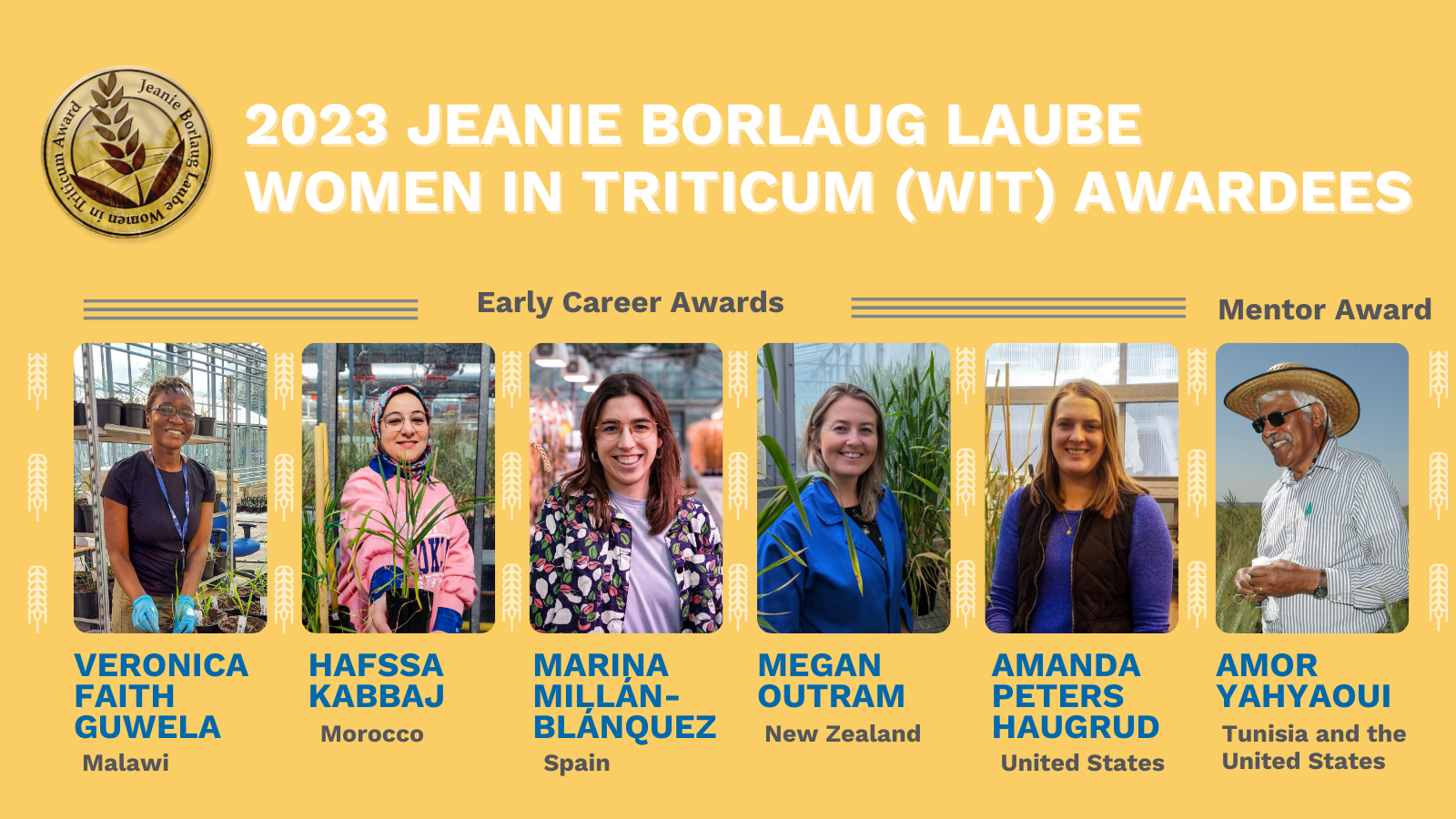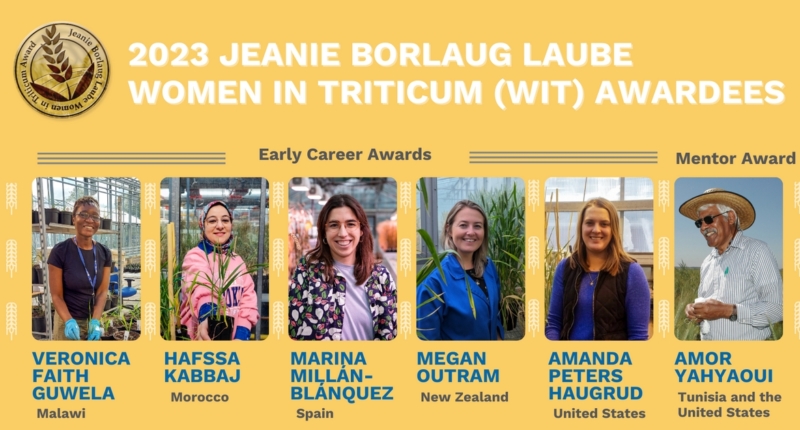The Borlaug Global Rust Initiative (BGRI) announced the winners of the 2023 Jeanie Borlaug Laube Women in Triticum (WIT) Early Career and Mentor Awards, recognizing excellence in science and leadership for a wheat-secure future. The WIT awards celebrate early-career women scientists and those who have excelled at mentoring women working in wheat and its nearest cereal relatives. This year’s winners include innovative wheat researchers from Malawi, Morocco, New Zealand, Spain, Tunisia, and the United States. The WIT Early-Career Award winners are experts in genomic selection, fertility in bread wheat, interactions between rust fungi and wheat, pre-breeding and germplasm improvement. The WIT Mentor Award winner enhanced academic and hands-on training on wheat improvement for junior scientists and led the initiative that led to women researchers earning seven Ph.D. and two MSc degrees in a six-year period. The WIT awards have proven to be influential in shifting gender dynamics towards more equity in wheat science.

The Borlaug Global Rust Initiative (BGRI) has recently announced the winners of the 2023 Jeanie Borlaug Laube Women in Triticum (WIT) Early Career and Mentor Awards. These awards are given to women who have shown excellence in science and leadership in the field of wheat research and its nearest cereal relatives, as well as those who have demonstrated exceptional mentorship skills. The winners are early-career wheat scientists from six different countries, namely Malawi, Morocco, New Zealand, Spain, Tunisia, and the United States.
According to Jeanie Borlaug Laube, the chair of the BGRI, these scientists have shown an impressive drive and vision towards achieving food security, and they are following the footsteps of her father, Nobel Peace Prize winner Norman E. Borlaug, in fighting hunger worldwide. The WIT Early-Career Award is designed to provide additional training, mentorship, and leadership opportunities for women working in wheat, while the WIT Mentor Award recognizes men and women who have played a significant role in shaping the careers of women working in wheat and promoting gender parity in agriculture.
Since its establishment in 2010, the WIT awards have recognized 71 early-career award winners from 31 countries and 13 mentors from 9 countries. This year’s winners include Veronica Faith Guwela from Malawi, who is a Ph.D. student at the University of Nottingham and focuses on identifying new sources of increased grain zinc and iron concentration in African varieties of wheat and wild relatives. The other awardee is Hafssa Kabbaj from Morocco, who is working on identifying novel sources of resistance to wheat rust diseases.
The WIT awards have been influential in promoting gender equity in wheat science, and the winners of the award are increasingly taking up leadership roles in scientific settings worldwide. Maricelis Acevedo, the director for science for the BGRI, believes that these newest awardees have the potential to continue this trend towards a more inclusive future in wheat research.
In conclusion, the 2023 Jeanie Borlaug Laube Women in Triticum (WIT) Early Career and Mentor awardees have been recognized for their outstanding contributions to wheat research and their dedication to promoting gender equity in agriculture. Their achievements represent a significant step towards achieving food security and a more inclusive future in wheat science.
The Borlaug Global Rust Initiative (BGRI) has recently announced the winners of the 2023 Jeanie Borlaug Laube Women in Triticum (WIT) Early Career and Mentor Awards, recognizing excellence in science and leadership for a wheat-secure future. The awards celebrate early-career women scientists and those who have excelled in mentoring women working in wheat and its nearest cereal relatives.
The winners of the WIT Early-Career Award include Hafssa Kabbaj from Morocco, Marina Millán-Blánquez from Spain, Megan Outram from New Zealand, and Amanda Peters Haugrad from the United States. Hafssa Kabbaj is an expert in genomic selection for the durum wheat breeding program at the International Center for Agricultural Research in the Dry Areas (ICARDA) in Morocco. Her work focuses on implementing genomic selection and speed breeding tools to deliver superior cultivars to national partners from Central and West Asia, North Africa, and West Africa. Marina Millán-Blánquez, a Ph.D. student from Spain, studies the genetic processes regulating different aspects of female fertility in bread wheat using a combination of approaches, including field trials, microscopy work, machine learning, and transcriptomics. Megan Outram, a postdoctoral research fellow from New Zealand, focuses on developing molecular understanding of the interactions between rust fungi and wheat through structural biology and protein biochemistry. Amanda Peters Haugrad, a research geneticist from the United States, conducts pre-breeding and germplasm improvement for both tetraploid and hexaploid wheat, focusing on the Great Plains region.
The WIT Mentor Award winner is Amor Yahyaoui, a dual citizen of Tunisia and the United States and vice president of the Borlaug Training Foundation. Amor’s work has spanned organizations on multiple continents, with positions at the University of Tunis, ICARDA, and CIMMYT. As Wheat Training Officer at CIMMYT from 2012-2018, he enhanced academic and hands-on training on wheat improvement for junior scientists from over 20 countries annually. There he developed a modular advanced wheat improvement course for mid-career scientists. In Tunisia, he initiated the CRP-Wheat Septoria Precision Phenotyping Platform, which led to women researchers earning seven Ph.D. and two MSc degrees in a six-year period.
The WIT awards have proven to be influential in shifting gender dynamics towards more equity in wheat science. The winners of the award are taking on leadership roles in scientific settings all over the world, and these newest awardees have the potential to continue that trend towards a more inclusive future.
The 2023 Women in Triticum (WIT) Award winners have been announced by the Borlaug Global Rust Initiative (BGRI). The WIT awards recognize excellence in science and leadership for a wheat-secure future and celebrate early-career women scientists and those who have excelled in mentoring women working in wheat and its nearest cereal relatives.
Don’t miss interesting posts on Famousbio

